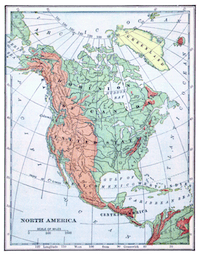
How do I get to Boston again?
When you’re trying to get somewhere unfamiliar, it’s good to have a map to follow. When I consider how to use technical tools in my practice — i.e. my phone’s texting features, my computer or website — these four principles are the map that I use. I developed them based on my own knowledge of what I need in my practice as well as what I’ve gleaned from my profession’s ethical codes and laws.
The principles are not a replacement for peer consultation and supervision, of course, but they can be helpful in those contexts. I hope you find them useful yourself.
Person-Centered Tech’s four-point map for considering tech tools in clinical practice:
- Proactive Awareness: I will strive to be aware of the limitations of my tools, and to accommodate for the potential risks to client confidentiality and safety that come with their use.
- Appropriate Use: I will keep clients informed of the limitations and dangers of the tools I use in my office and online, and will only enter into their use with clients where it is appropriate.
- Professional Presence: My presence in virtual mediums will be professional and will be as attentive to clients’ rights and needs as my brick-and-mortar presence.
- Therapeutic Value Add: I will favor tools that add to the work I’m doing with my clients, and avoid ones that add nothing or detract from it.
Learn more about the services and tools we recommend in your practice:
 This is Step 1: Service Selection of the PCT Way.
This is Step 1: Service Selection of the PCT Way.
Build your tech stack without fear. Learn More.

I almost want to cover my eyes and pretend this all doesn’t apply to me, but of course it does. I am a covered entity and am hoping I am doing everything possible to cover my own butt re: HIPAA compliancy. I, ahem, should certainly take one of your ethics trainings, Roy, when it becomes available again. Thanks for encouraging me to read this, even though I really didn’t want to :)
Hi Michelle,
Well, I’m glad it was helpful. :) Remember to take it piece by piece and you’ll be alright.
I should say that my training isn’t a HIPAA training, per se. That’s a different beast. I imagine it could still help, however.
Thanks for commenting!
Hi Roy –
I got so much new info from your ethics class, and have been searching for more ways to protect not only myself, but my clients. This is a website that I found that seems important; https://www.eff.org/wp/six-tips-protect-your-search-privacy
Please tell me what you think about it?
Best,
Trina
Hi Trina,
Thanks for your comment!
It looks like you discovered the Electronic Frontier Foundation. The EFF is the world’s premier defender of civil liberties in the digital realm and the most staunch defender of our rights to privacy and freedom on the Internet, in software, in government surveillance, etc.
Basically, I trust pretty much anything the EFF says about online privacy. The link you provided is talking about maintaining privacy when doing Web searches, and all the advice marked as “easy” that I see there is generally considered to be good practices. The more advanced stuff, such as using a proxy server when you make a Web search, is useful to techies who are super serious about privacy. If you follow the “easy” rules, however, that will take you far, in my opinion.